Abstract
Using intact leaves of Spinacia oleracea (L.), reversible temperature-induced changes in chlorophyll fluorescence emitted at room temperature and at 77K were studied. Interpretation of fluorescence at 77K was largely facilitated by developing a new method to minimize reabsorption artifacts (`diluted leaf-powder'). Leaves of plants grown at 15 to 20°C were exposed for several hours to different temperatures. Upon incubation at 35°C in the dark or in the light, the following changes in 77K fluorescence occurred with a half-time of less than 1 hour: (a) the initial fluorescence (F0) of photosystem I increased by 15%, while that one of photosystem II somewhat decreased; (b) although variable fluorescence declined in both photosystems, the decrease in photosystem II (40%) was more severe; (c) the changes were less significant after 480-nanometer excitation light was replaced by 430-nanometer light. The data were interpreted in terms of a reversible, temperature-induced change in thylakoid structure and related change in the distribution of the absorbed energy in favor of photosystem I, at the expense of photosystem II excitation, probably accompanied by an increase in the rate of thermal deactivation of excited states. The considerable decrease in the variable part of room temperature fluorescence gives rise to the suggestion that this transition has lowered the reduction level of plastoquinone, i.e. has increased electron flow through photosystem I, relative to photosystem II. Possible physiological and mechanistic analogies between this temperature-induced state transition and the light-dependent state 1-state 2 regulation has been discussed.
Full text
PDF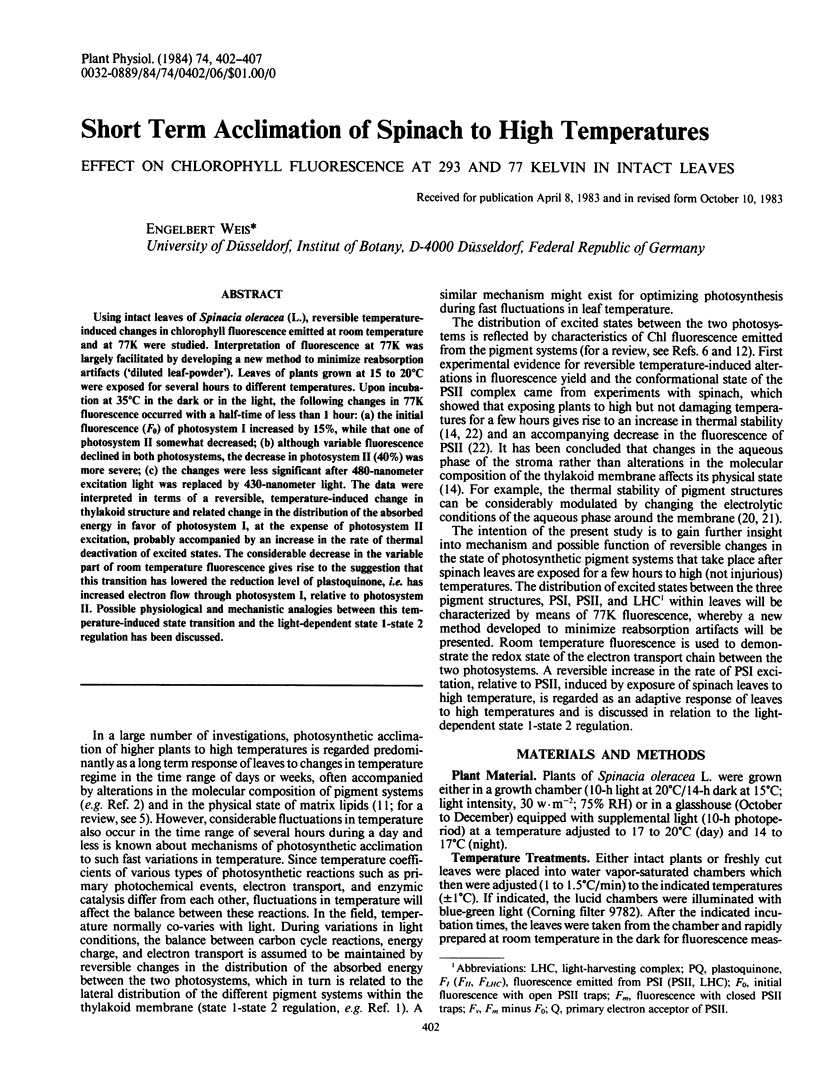
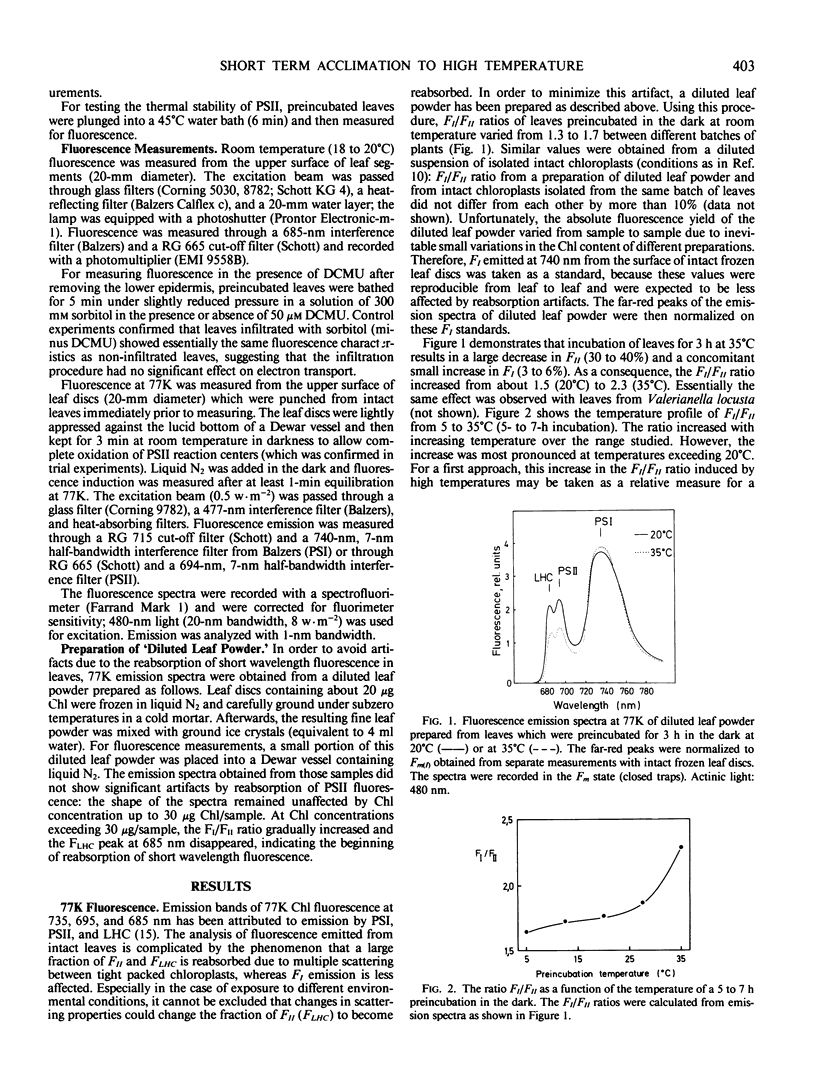
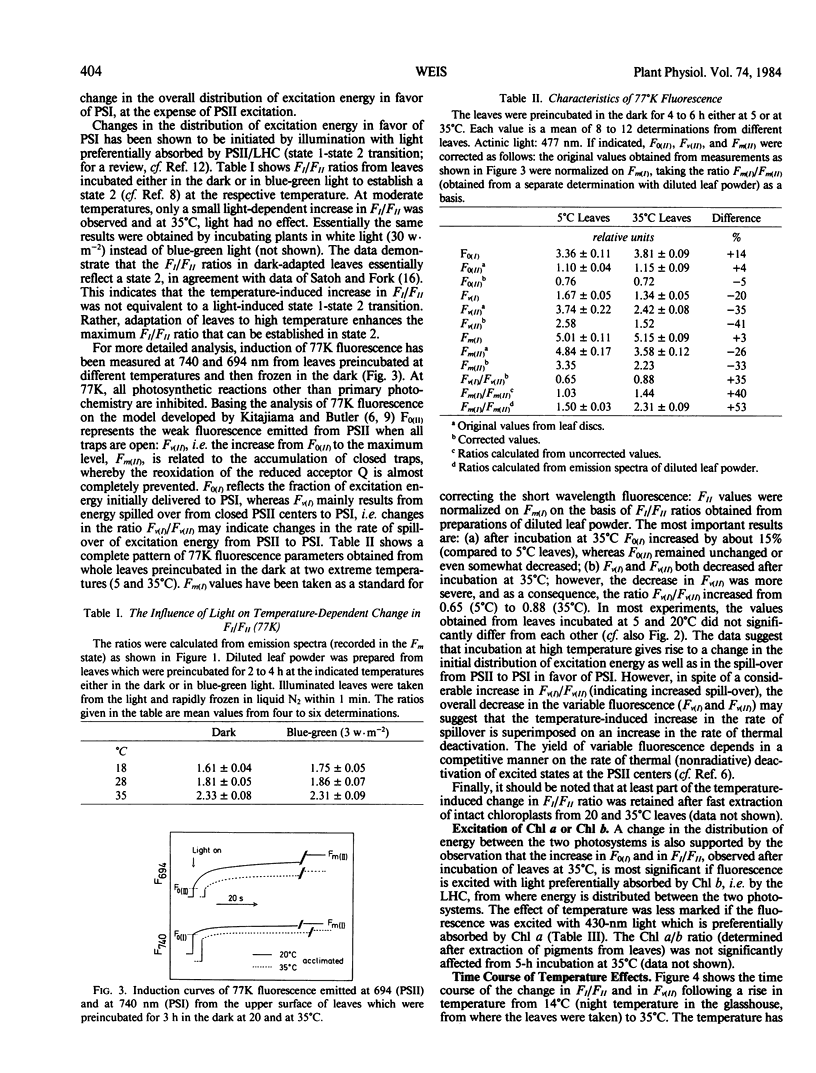
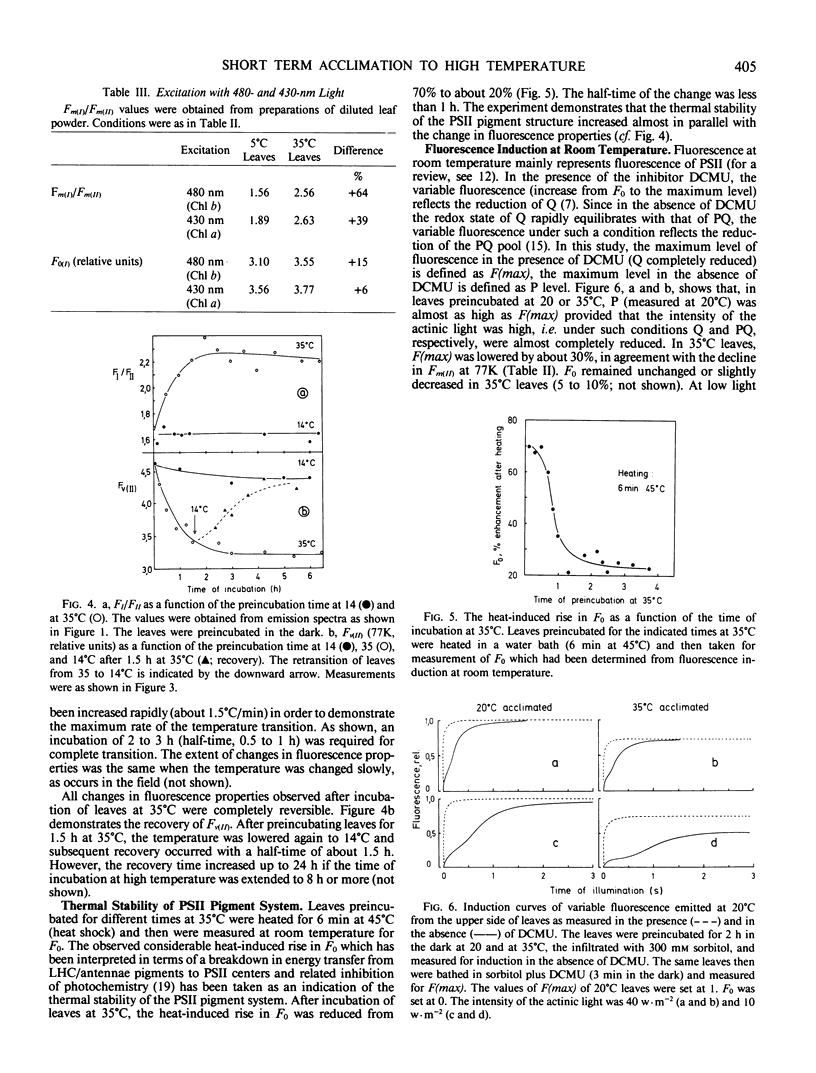
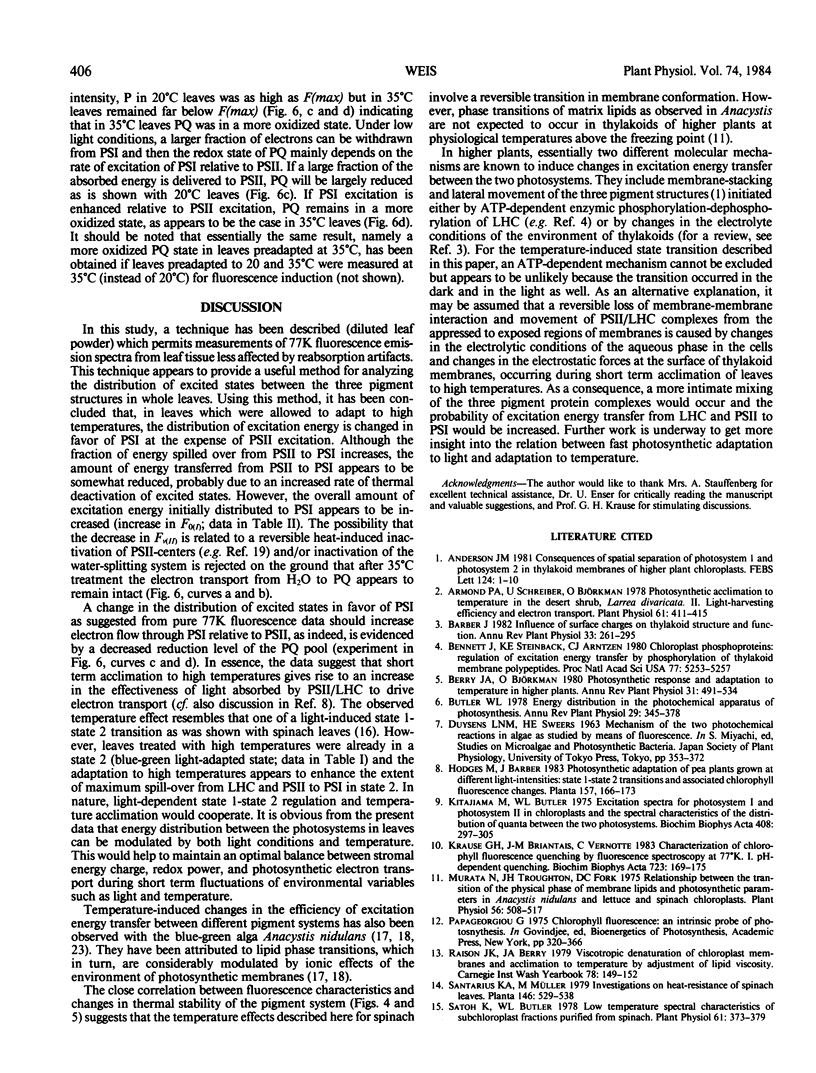
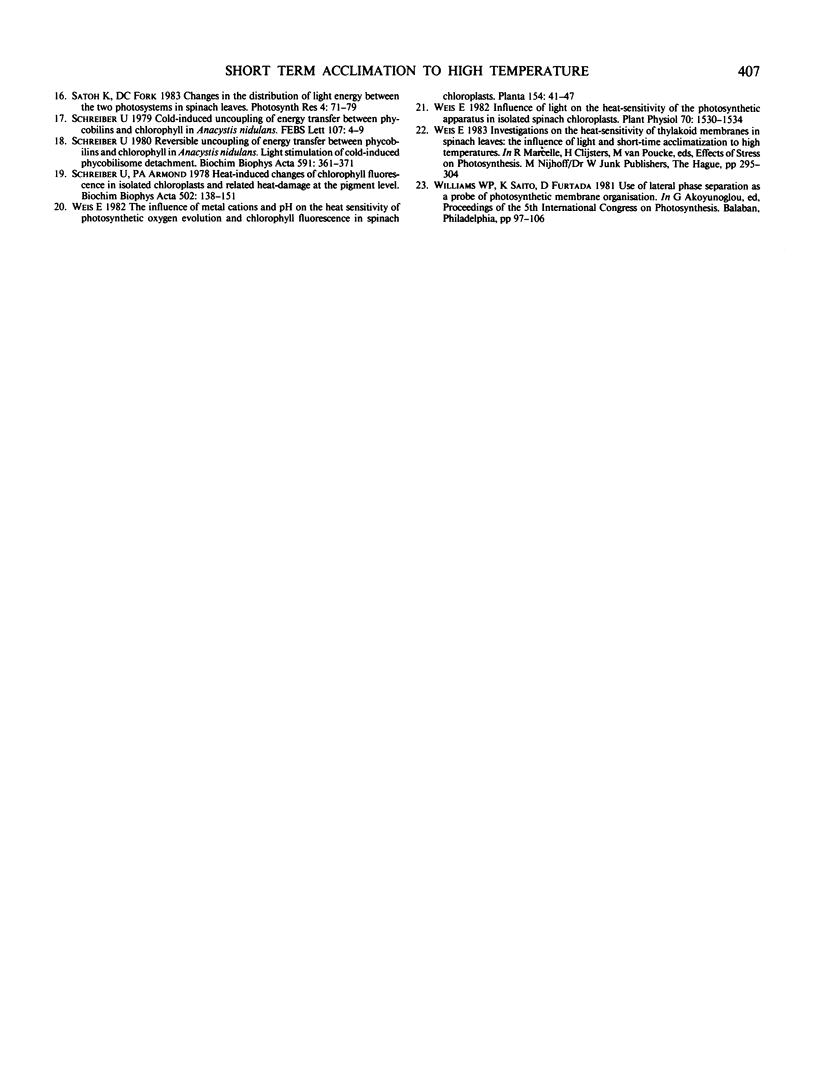
Selected References
These references are in PubMed. This may not be the complete list of references from this article.
- Armond P. A., Schreiber U., Björkman O. Photosynthetic Acclimation to Temperature in the Desert Shrub, Larrea divaricata: II. Light-harvesting Efficiency and Electron Transport. Plant Physiol. 1978 Mar;61(3):411–415. doi: 10.1104/pp.61.3.411. [DOI] [PMC free article] [PubMed] [Google Scholar]
- Bennett J., Steinback K. E., Arntzen C. J. Chloroplast phosphoproteins: regulation of excitation energy transfer by phosphorylation of thylakoid membrane polypeptides. Proc Natl Acad Sci U S A. 1980 Sep;77(9):5253–5257. doi: 10.1073/pnas.77.9.5253. [DOI] [PMC free article] [PubMed] [Google Scholar]
- Kitajima M., Butler W. L. Excitation spectra for photosystem I and photosystem II in chloroplasts and the spectral characteristics of the distributions of quanta between the two photosystems. Biochim Biophys Acta. 1975 Dec 11;408(3):297–305. doi: 10.1016/0005-2728(75)90131-0. [DOI] [PubMed] [Google Scholar]
- Murata N. Relationships between the Transition of the Physical Phase of Membrane Lipids and Photosynthetic Parameters in Anacystis nidulans and Lettuce and Spinach Chloroplasts. Plant Physiol. 1975 Oct;56(4):508–517. doi: 10.1104/pp.56.4.508. [DOI] [PMC free article] [PubMed] [Google Scholar]
- Satoh K., Butler W. L. Low temperature spectral properties of subchloroplast fractions purified from spinach. Plant Physiol. 1978 Mar;61(3):373–379. doi: 10.1104/pp.61.3.373. [DOI] [PMC free article] [PubMed] [Google Scholar]
- Schreiber U., Armond P. A. Heat-induced changes of chlorophyll fluorescence in isolated chloroplasts and related heat-damage at the pigment level. Biochim Biophys Acta. 1978 Apr 11;502(1):138–151. doi: 10.1016/0005-2728(78)90138-x. [DOI] [PubMed] [Google Scholar]
- Schreiber U. Cold-induced uncoupling of energy transfer between phycobilins and chlorophyll in Anacystis nidulans: antagonistic effects of monovalent and divalent cations, and of high and low pH. FEBS Lett. 1979 Nov 1;107(1):4–9. doi: 10.1016/0014-5793(79)80450-0. [DOI] [PubMed] [Google Scholar]
- Schreiber U. Reversible uncoupling of energy transfer between phycobilins and chlorophyll in Anacystis nidulans: light stimulation of cold-induced phycobilisome detachment. Biochim Biophys Acta. 1980 Jul 8;591(2):361–371. doi: 10.1016/0005-2728(80)90167-x. [DOI] [PubMed] [Google Scholar]
- Weis E. Influence of light on the heat sensitivity of the photosynthetic apparatus in isolated spinach chloroplasts. Plant Physiol. 1982 Nov;70(5):1530–1534. doi: 10.1104/pp.70.5.1530. [DOI] [PMC free article] [PubMed] [Google Scholar]


